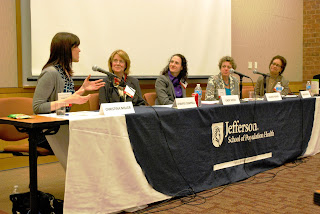Patrick Monaghan
JSPH Director of Communications
The School of Population Health acknowledged National Public Health Week (NPHW) by hosting a lunchtime symposium, “Meeting Again at the Crossroads: Social Work and Public Health.” Since 1995, the first full week of April has been a time when communities across the United States recognize the contributions of public health and highlight issues that are important to improving our nation.
This year, JSPH took a closer look at the connection between public health and social services. Although the two fields share historical roots, their paths have diverged until recently. But today’s complex health issues require the expertise of both professions and the lunchtime symposium explored the intersection of public health, social services, health care, and health policy.
Moderated by Darlyne Bailey, PhD, LISW, Dean and Professor at the Graduate School of Social Work and Social Research (GSSWSR) of Bryn Mawr College, panelists included Cindy Sousa, PhD, MSW, MPH, an Assistant Professor at GSSWSR; Jennifer Campbell, PhD, MSW, a consultant, and Lecturer at GSSWSR; JoAnne Fischer, MSS, Executive Director of the Maternity Care Coalition and Bryn Mawr alumna; and Christina Miller, MSS, Senior Program Director of the Health Promotion Council, and also a Bryn Mawr Alumna.
Each provided a vital element of the formula that fuses public health and social work, from Christina Miller’s work with the Health Promotion Council, which has programs that include chronic disease risk reduction and professional education and consulting; to Cindy Sousa’s research on investigations of violence, stress and trauma and their relationships to health and well-being; to JoAnne Fischer’s work making the needs of mothers and their families visible through policy advocacy and research as executive director of the Maternity Care Coalition; to Jennifer Campbell’s work strengthening grantmaking for an aging society.
The symposium served as a poignant reminder that many quality improvement techniques – including the promotion of evidence-based treatments and well-coordinated care – can improve health outcomes, but their influence is often limited by factors beyond clinicians’ control, such as patients’ education, employment, and social support. In order to address the social and economic factors that affect health, quality improvement initiatives must reach beyond the traditional boundaries of the health care system. The panelists gathered at JSPH this week was representative of the community-based partnerships that bring a wide range of stakeholders – health care providers, educators, business leaders, social service providers, community organizations, and clergy – together to promote healthy behavior, improve access to primary and preventive care, and reduce health disparities.
The program also further strengthened the partnership between JSPH and GSSWSR. Last fall, the schools began offering a dual degree MSS/MPH program, acknowledging the long-standing synergy between social work and public health, and also recognizing the growing interest among professionals to further their preparation by earning multiple graduate degrees.
